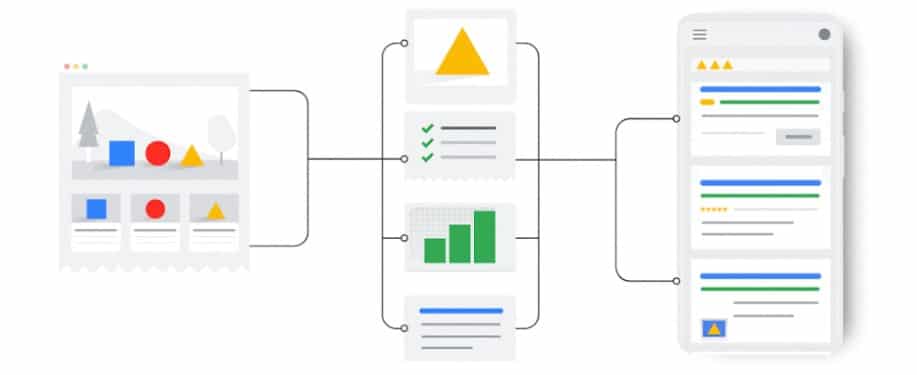Every day, 15% of all Google search queries are entirely new.
To keep pace with this evolution, Google is cementing its focus on automation in 2022. As of June 30, 2022, Google will sunset extended text ads and has announced, “responsive search ads will be the only Search ad type that can be created or edited in standard Search campaigns.” For businesses that need to switch from extended text ads, Google states that dynamic search ads (DSAs) can help advertisers simplify the ad creation process while driving performance with automation.
But how well can DSAs really drive performance, and which businesses can see the most success with this ad type?
Having utilized DSAs from their inception, our expert team knows what works best for exceptional results and is sharing the ‘receipts’ to back it up.
Jump to the following sections:
What are dynamic search ads?
How do dynamic search campaigns work?
Are dynamic search ads worth it?
What’s the data on dynamic search campaign success?
How to create the ideal dynamic search ad
What are dynamic search ads?
Dynamic search ads use website content to create the optimal ad for a Google search query. Specifically, the ad’s headlines and landing pages are created directly from website content, guaranteeing ads are relevant to both the brand and customers searching online. DSAs can simplify ad creation and help fill holes in keyword-based campaigns as search queries evolve. Advertisers only need to add a creative description, and Google Ads takes care of the rest.
While they may seem too good to be true, DSAs have been a key piece of search advertisers’ toolkits since 2011. With the 2022 sunset of expanded text ads, DSAs are now an even more important tool for advertisers looking to compete and excel in search.
The DSA journey from site content to search ad

How do dynamic search campaigns work?
At its most basic, DSAs use website content to target ads to searches. DSAs pull content from chosen landing pages throughout a site for a variety of targeting options, including but not limited to:
- Landing pages from your standard ad groups
- Google-recommended categories from your website
- URL targeting for both ‘equals’ and ‘contains’
- Custom labels
- Page title
- Page content
DSAs also dynamically generate their own headlines to target relevant searches based on users’ search queries and the landing page or domain text. Google states its web crawling technology “will find text that can be used for headlines relevant to the page content, which can then drive more searches to your page.”
For example, your business is a national rental car company with locations across the country. A Google user would search for “rental car los angeles”, and Google would generate an ad headline such as “Rental Cars – LA”. This headline would come directly from your website content and speak precisely to the searcher’s need.
Are dynamic search ads worth it?
Generally, yes, DSAs can bring measurable wins to your business. Mid-size to enterprise businesses, especially those with a large inventory, stand to benefit most from dynamic search ads. However, this doesn’t mean that other types of companies shouldn’t consider them as well. With DSAs, advertisers can build holistic campaigns that catch any keyword gaps and let Google do the work as it crawls your website.
DSAs offer many benefits rooted in convenience and control. This ad type hands advertisers more control with even better performance, allowing them to choose specific products to advertise. Once chosen, DSAs are easy to create, with certain campaigns able to start running within just a few hours.
What’s the data on dynamic search campaign success?
Google has shared internal data on trivago’s success with DSAs. trivago, an international hotel booking site, saw significantly lower CPAs for established markets when it switched to DSA campaigns.
Here’s a highlight from just one dynamic search campaign in action at Amsive Digital.
Our B2B client saw a 39% cheaper cost per qualified lead compared to a non-dynamic search campaign. Additionally, the client also had a 16% increase in its qualified lead count when using a dynamic search campaign.
Dynamic Search Campaign Performance at Amsive Digital
How to create the ideal dynamic search ad
Google offers general guidance on how to ensure DSAs are successful. In short, successful DSA campaigns excel with clean code and clear content.
The quality of your site is as important as the quality of your ads.
“Create a Dynamic Search Ad”, Google
While improving your website is a constant evolution, one key piece with a strong business case is Google’s Core Web Vitals. Our expert development team has created a comprehensive guide to understanding your site’s Core Web Vitals Score and the best practices that you can use to improve it. Optimizing your site for Core Web Vitals is imperative to improve your site — and your ads.
In addition to clean code, DSAs ask advertisers to write the description copy, offering an opportunity for brands to stand out. Impactful copy is built from the perfect blend of data and creativity and wholeheartedly engages your target audience. By including this in its recommendations, Google recognizes that developing a clear brand voice to communicate across channels from website to ad and beyond is a foundational pillar of every campaign.
Dynamic search ads are a powerful tool in every advertisers’ toolkit and remind us that relinquishing control doesn’t have to mean giving up performance. Often, it can be the opposite. Working smarter means letting the latest technology work for you by using the right tool for each campaign. This strategic decision-making is the foundation of exceptional results and sustainable business growth.
To learn more insights about Google advertising, read Google Discovery Ads: Optimize Campaigns + Save Time with the Modern Search Journey.







